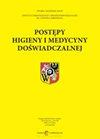Effect of amygdalin on MCF-7, MDA-MB-231 and T-47D breast cancer cells in the in vitro study
IF 0.3
4区 医学
Q4 MEDICINE, RESEARCH & EXPERIMENTAL
引用次数: 2
Abstract
Abstract Introduction Amygdalin is a chemical compound found in the seeds of many edible plants. Different studies using cancer cell cultures in vitro indicate its potential anti-cancer activity. Various types of cancer cells showed different responses to different doses of amygdalin. This may suggest many in vitro models of the activity of this compound. The aim of the study was to evaluate the effect of amygdalin on MCF-7, MDA-MB-231, and T-47D breast cancer cells and on HFF-1 normal dermal fibroblasts (control cell culture) in vitro. Cell proliferation, viability, and the changes in mRNA transcript levels of basic proteins (BAX, caspase 3 and BCL-2) involved in apoptosis were analyzed. Materials and Methods MCF-7, MDA-MB-231, T-47D, and HFF-1 cell lines were purchased from the ATCC. Amygdalin derived from apricot kernels was purchased from Sigma-Aldrich. CVDE, WST-1, and LDH assays were used to evaluate the effects of amygdalin on cell proliferation and viability. Molecular evaluation of gene transcription levels was performed using the RT-qPCR technique. Results Amygdalin causes a dose-dependent decrease in proliferation and metabolic activity of MCF-7, MDA-MB-231, and T-47D cells in the in vitro cultures. In all cell cultures amygdalin affects the mRNA levels of pro-apoptotic BAX and caspase 3 proteins and anti-apoptotic BCL-2 protein. Conclusions Amygdalin anti-cancer activity may be selective in relation to different cell types. It seems that examined breast cancer cells are more sensitive to amygdalin than normal cells.苦杏仁苷对MCF-7、MDA-MB-231和T-47D乳腺癌细胞的体外影响
苦杏仁苷是一种存在于许多可食用植物种子中的化合物。不同的体外癌细胞培养研究表明其潜在的抗癌活性。不同类型的癌细胞对不同剂量的苦杏仁苷表现出不同的反应。这可能暗示了该化合物活性的许多体外模型。本研究的目的是评估苦杏仁苷对MCF-7、MDA-MB-231和T-47D乳腺癌细胞和HFF-1正常真皮成纤维细胞(对照细胞培养)的体外作用。分析细胞增殖、活力及凋亡相关基础蛋白(BAX、caspase 3、BCL-2) mRNA转录水平的变化。材料和方法MCF-7、MDA-MB-231、T-47D和HFF-1细胞系购自ATCC。从杏仁中提取的苦杏仁苷是从Sigma-Aldrich购买的。采用CVDE、WST-1和LDH检测苦杏仁苷对细胞增殖和活力的影响。采用RT-qPCR技术对基因转录水平进行分子评价。结果苦杏仁苷使体外培养的MCF-7、MDA-MB-231和T-47D细胞的增殖和代谢活性呈剂量依赖性降低。在所有细胞培养中,苦杏仁苷影响促凋亡BAX和caspase 3蛋白以及抗凋亡BCL-2蛋白的mRNA水平。结论苦杏仁苷的抗癌作用可能与不同的细胞类型有关。研究表明,乳腺癌细胞比正常细胞对苦杏仁苷更敏感。
本文章由计算机程序翻译,如有差异,请以英文原文为准。
求助全文
约1分钟内获得全文
求助全文
来源期刊

Postȩpy higieny i medycyny doświadczalnej
MEDICINE, RESEARCH & EXPERIMENTAL-
CiteScore
0.60
自引率
0.00%
发文量
50
审稿时长
4-8 weeks
期刊介绍:
Advances in Hygiene and Experimental Medicine (PHMD) is a scientific journal affiliated with the Institute of Immunology and Experimental Therapy by the Polish Academy of Sciences in Wrocław. The journal publishes articles from the field of experimental medicine and related sciences, with particular emphasis on immunology, oncology, cell biology, microbiology, and genetics. The journal publishes review and original works both in Polish and English. All journal publications are available via the Open Access formula in line with the principles of the Creative Commons licence.
 求助内容:
求助内容: 应助结果提醒方式:
应助结果提醒方式:


